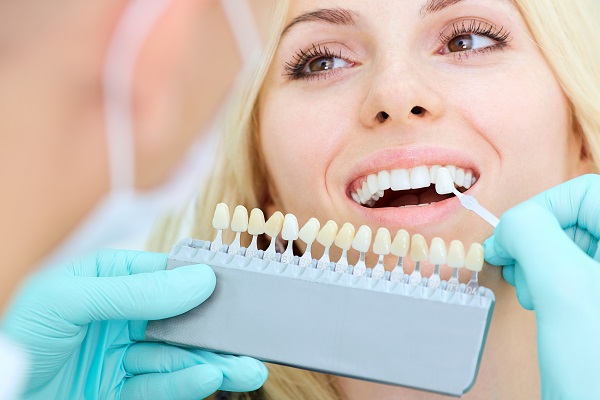FAQs About the Use of Veneers in Cosmetic Dentistry

Dental veneers are quite popular in cosmetic dentistry. Veneers are thin materials bonded over the front of a tooth to transform its appearance. Patients who are considering the procedure often ask many questions before making educated decisions. Continue reading to find answers to frequently asked questions.
Frequently asked questions about veneers
What veneer options are available?
Composite and porcelain are the most common materials used for veneers. Composite veneers are created from resin composite that the dentist shapes and bonds over the tooth in the office. Porcelain veneers are usually made in the dental lab with the impressions provided by the dentist. They are more popular, durable and more resistant to staining than other materials.
Why would someone need dental veneers?
Veneers are an excellent solution to fix different cosmetic imperfections in the smile. It can restore the shape, size and color of a chipped, worn down or discolored tooth. Dentists even use them as a quick teeth-straightening treatment to correct minor orthodontic issues.
What is involved in the procedure?
Getting porcelain veneers involves multiple steps. The first step is to meet with the dentist for a consultation, during which the dentist will ascertain the patient’s smile goals and proceed to prepare the tooth for the veneer. A small layer of the tooth's structure is scraped off and the impression is created. The dentist will place the final veneer on the tooth during a second dental appointment.
What are the advantages of dental veneers?
Veneers application is conservative for the tooth structure since only a small portion of it is removed. Veneers improve a person’s smile and allow them to smile confidently again. Porcelain material also has the qualities of the natural teeth and is usually hard to detect after customization and placement.
Who is not eligible for the procedure?
Most people are candidates for veneers. If there is an infection or extensive tooth decay, it is not advisable to cover it with veneers. The dentist will need to remove the decay before starting the procedure. Habitual teeth grinding can also be an issue, as it could cause damage to a veneer. Patients can talk to a dentist for potential solutions, such as a nightguard. Veneers are not ideal for those with poor gum health.
What are the drawbacks of getting veneers?
After the dentist prepares a tooth for a veneer, the process is irreversible and the tooth will always need protection. When a veneer cracks, repairing it is difficult; it will most likely need to be replaced. Finally, veneers will not protect a tooth from decay or damage, so good oral health habits are still necessary.
How long do dental veneers last?
Usually, a veneer survives between five and 10 years of use. There are no special maintenance required aside from regular brushing, flossing and visiting the dentist regularly. With proper care, veneers can survive for much longer. Nail biting and chewing on hard objects can damage the cometic dentistry restoration.
In conclusion
If you are looking to transform your smile or have additional questions about the use of veneers, contact the dental office to book an appointment.
Request an appointment here: https://hemetdentalcenter.com or call Hemet Dental Center: Brian Stiewel DDS, INC. at (951) 707-4366 for an appointment in our Hemet office.
Check out what others are saying about our services on Yelp: Read our Yelp reviews.
Recent Posts
Tooth extraction is a common dental procedure where a dentist removes a tooth from its socket in the jawbone. While it may seem intimidating, these procedures are often necessary to maintain oral health and prevent further complications. Here are the two types of tooth extractions that dentists use to improve your smile and overall health.Simple…
A routine dental checkup serves as the foundation for preserving long-term oral health. While daily brushing and flossing provide essential home care, they cannot replace professional evaluations. A dental checkup helps detect early signs of decay, gum disease, or bite issues before they become advanced, painful, or costly. For patients of all ages, staying consistent…
Tooth extractions are common dental procedures performed by general dentists. They can be a result of decay, disease, or a fracture. While the dentist may introduce it to preserve oral health, it is important to know what to expect during and after the operation.There are two types of tooth extractions, namely simple and surgical. Most…
General dentists, like any dental professional, strive to help patients keep all of their natural teeth. However, tooth extraction may be the only solution when gum disease becomes severe. A dentist can perform this oral health-saving procedure and recommend options to restore fullness to a patient's smile.Gum disease, or periodontal disease, is an oral health…


